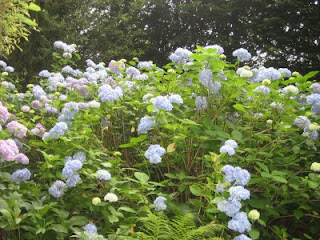Snatching a few minutes from work, here are my thoughts on my first day at Dartington - it was written that day, and I'm keeping it as such, so that even though the days have gone by now, you still get a feel for what I was doing and when!
As someone who has never been to a literary festival apart from Oxford, the idea of taking a few days off (or ten, if your hardcore and have nothing else in the way) and travelling to Devon (or anywhere else in the country) is a new one to me.
Yet here I am ... sitting on a Penguin deck chair (The Garden Party, not The Big Sleep) being ever so British and forcing myself outdoors in the threat of rain. I can hear the whistle of a steam train as it makes its journey past the river Dart, and having found my accommodation - by a swimming pool no less (why didn't I think of bringing a cossie?) I have ventured out to explore. And I love it.
Not knowing when I would arrive - trains being what they are - I didn't buy any tickets for today, but am now happily in the possession of two to hear about Lydia, Bloomsbury Ballerina and Idina Sackville - The Bolter, which I'd seen reviewed on Lynne's blog, and was fascinated by. I'm trying to resist the temptation of the Waterstones bookshop to my right and I'm going in search of food. Breakfast was a long time ago!
*****
Food was found and proved to be both delicious and expensive ... I added to my cash depletion by going into the second hand bookshop and finding a first edition of Enchanted Cornwall amongst other things.
Off I went to join the queue to the barn, and ran into someone I'd met at Port Eliot. I then spent two hours listening to the tales of women who were both strong and yet lacked the ability to stick with their lives when the going got tough. Frances Osborne's talk about her maternal grandmother, Idina Sackville was both fascinating and moving, and you could tell that she was in danger of being overly moved whilst in the middle of speaking. I bought her book, although Lydia was left where she was - a good move as it was about the size and weight of a couple of bricks.
It was then about six pm, and since I'd got a ticket for the evening event, I sought food. I ordered a salad (cheapest thing on the menu, although that was the only time I used that rule!) and pressed myself on two ladies who had a spare seat. Which turned out to be rather a good move. They were chatty and friendly and if I hadn't already bought my ticket I might have been tempted to give Robin Ince a miss. Off I trotted though, and was very glad I'd followed my instinct.
I had decided to sit in one of the windows, climbing up the bench steps without the grace of a mountain goat. This perhaps wasn't the best move, as I was in danger of repeatedly falling out of my seat as Robin gave us a variety of readings from strange books he had picked up in charity shops. Everything ranging from Mill and Boon to pet guides on rabbits (which included advice on the best way to kill it when the time came). This was all truly bizarre, but great fun too.
The end of the first day had come, and I walked back to my room. Dartington really is a great place to hold events like these - the history of the place combined with the wonderful stories that are told make it truly magical.

















 It's lacking a few though - the wonderful Waterstones staff very kindly agreed to post four that I wanted signed but couldn't be at the events myself .... Claire Tomalin, Helen Rappaport and Katharine Whitehorn will all join the collection soon!
It's lacking a few though - the wonderful Waterstones staff very kindly agreed to post four that I wanted signed but couldn't be at the events myself .... Claire Tomalin, Helen Rappaport and Katharine Whitehorn will all join the collection soon!

